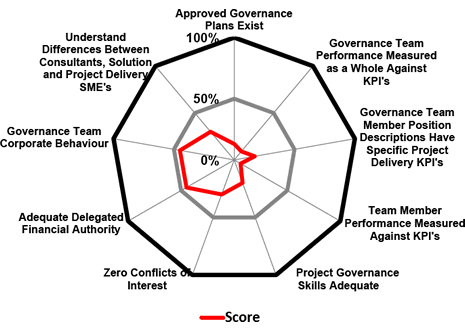Press Releases
CEO survey shows Australia’s major projects fail because of ‘dysfunctional’, unaccountable Governance Teams
SYDNEY, Australia –3rd May 2013. A survey of chief executives and other senior management around Australia lays the blame for failed major projects – such as large complex infrastructure projects – on poor project governance.
New research by Sydney consultancy Caravel Group and an Australian Business School has found major project Governance Teams are often dysfunctional, lack the skills and experience to govern major projects, exhibit poor corporate behaviour, are conflict-ridden and rarely have their performance measured or reviewed, the study finds.
Caravel Group Director and CEO Paul Myers said the survey of approximately 100 public and private sector Board, CEO and senior management-level project participants, across a range of industries, had yielded some stark assessments.
“The survey found that project success rates in Australia are on average in the range of 40-50 per cent. One can only wonder what this is costing the country?”
Some research outside of the survey suggests that some of these costs have already been determined. For example, Infrastructure Australia discussed evidence at a Senate Committee Hearing1 that $6bn a year is wasted through tendering processes and a further $6bn through litigation (figures from Engineers Australia during inquiry into skills shortages). Some preliminary calculations of our own, suggests a further sum in the order of $35bn p.a. is being wasted through poor delivery performance that relates directly to Project Governance. In aggregate, this level of waste is costing each and every one of the 11m households in Australia in the order of $4,000 p.a. - a figure few can afford. So the real question is; what can and/or is being done to eliminate or significantly reduce this waste?
Mr Myers said the survey challenged traditional explanations of where major projects came unstuck.
“Blame for failure has traditionally been laid at the door of the Project Management team. However, it appears that most of the fault actually lies with the Project Governance team”.
Project Management teams focus on creating the deliverables in accordance with the scope of work. They manage the people, money and resources and all other facets for delivery. The project Management team reports to the Project Governance Team.
Aside from monitoring progress and supporting the Project Management Team, the main activity of the Project Governance Team should be to focus on the strategic intent of the project and delivery of the value promised in the business case. Project Governance therefore, encompasses authority, accountability, stewardship, leadership, direction and control exercised in an organisation to achieve this end.
“Too many Governance Teams are stacked with ‘stakeholders’ to secure buy-in, rather than people with proven ability to govern projects. These people are often heavily conflicted and have no accountability for their Project Governance role.
When measured against nine (9) basic elements for successful project Governance, the respondents deliver only an average score of only 24%. The most basic item being the existence of an approved Governance Plan is absent 87% of the time.
The

The survey results demonstrate that a major rethink and reform of Project Governance practices in Australia is required, Myers said.
1Rural and Regional Affairs and Transport Legislation Committee Tue 12th Feb 2013
About the author
The Caravel Group delivers Complex Infrastructure® projects in partnership with its high profile government and private Sector, blue chip clients.
Paul Myers is a seasoned Project/Program/Change Director with more than 30 years of experience across the transport, utilities, telecommunications and IT industries at operational, project and program level within Australasia. He has been pivotal to the success of many landmark, high-profile complex infrastructure programs.
Media inquiries/ details:
Paul Myers by email at Paul.Myers@caravelgroup.com.au
Web Site: www.caravelgroup.com.au
FAQ’s
Q1:- How do these results impact specific projects such as the NBN?
A1:- Our study did not address or review specific projects. The results are formed from the answers delivered by respondents. If our respondents are involved in any current projects being undertaken, we are not privy to this fact. It would be up to these organisations to review their specific circumstances and determine what action to take.
Q2:- Was this a quantitative or qualitative study?
A2:- This was a qualitative study across approximately 100 senior people experienced in major projects drawn from a wide range of industry sectors both public & private. While numbers have been used to represent the results it nonetheless is a qualitative study. Data convergence testing however demonstrated that steady state answers were established with the sample size for most questions. But what is particularly relevant is the large quantity (over 110 pages) of high quality commentary received that has been used to cross check the answers.
Q3:- How do these results apply to Public-Private Partnerships (PPP’s) and/or Alliance-Contracts?
A3:- Our study indicated that the results will apply to all types of contracts and in fact all types of projects.
Q4:- What is a SME?
A4:- Subject Matter Expert
Q5:- What is KPI?
A5:- Key Performance Indicator
Q6:- Are these results applicable to countries other than Australia?
A6: - Our study did not directly address this but it is highly likely that the results could be extended to many other countries. This is because Australia generally adopts the practices of international professional institutions
|